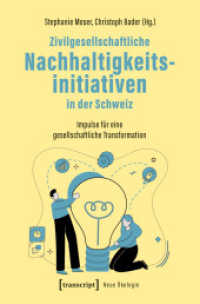- ホーム
- > 洋書
- > 英文書
- > History / World
Full Description
Voices of Conscience analyzes how the link between politics and conscience was articulated and shaped throughout the seventeenth century by confessors who acted as counsellors to monarchs. Against the backdrop of the momentous intellectual, theological, and political shifts that marked this period, the study examines comparatively how the ethical challenges of political action were confronted in Spain and France and how questions of conscience became a major argument in the hegemonic struggle between the two competing Catholic powers.
As Nicole Reinhardt demonstrates, 'counsel of conscience' was not a peripheral feature of early-modern political culture, but fundamental for the definition of politics and conscience. Tracing the rise and fall of confessors as counsellors reveals the parallel transformation of both, approaching a historical understanding of the modernisation of politics with the idea of an 'individual conscience' at its heart. Placed at the junction of norms and practices, royal confessors, directly or in oblique reflection, shaped the ways in which the royal conscience was identified and scrutinized. By the same token, the royal confessors' expertise and activities remained a source of anxiety and conflict that triggered wide debate on the relationship between State and Church, religion and politics.
The notion of 'counsel of conscience', of which this book provides the first in-depth analysis, allows the reader to re-examine and challenge fundamental historical paradigms such as the emergence of 'absolutism', individualisation, and the division of public and private. Putting theological concepts and religious dimensions back into political theory and practice sheds new light, not only on the importance of counselling for early modern statecraft, but also on the reconfiguration of the normative frameworks underlying it.
Contents
PART I: CHRISTIAN PRINCES, COUNSELLORS, AND CONFESSORS; PART II: ROYAL SINS: DEFINITIONS AND TRANSFORMATIONS (CA. 1550-1650); PART III: COUNSELS OF CONSCIENCE; PART IV: HOW TO BE A ROYAL CONFESSOR: FROM PROPHECY TO ECCLESIASTICAL HISTORY; PART V: THE ELOQUENCE OF SILENCE







